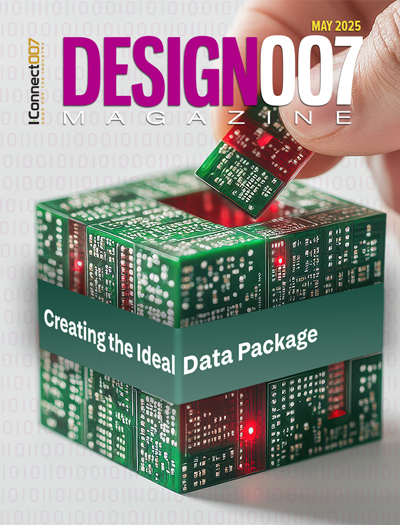-

- News
- Books
Featured Books
- design007 Magazine
Latest Issues
Current Issue
Creating the Ideal Data Package
Why is it so difficult to create the ideal data package? Many of these simple errors can be alleviated by paying attention to detail—and knowing what issues to look out for. So, this month, our experts weigh in on the best practices for creating the ideal design data package for your design.

Designing Through the Noise
Our experts discuss the constantly evolving world of RF design, including the many tradeoffs, material considerations, and design tips and techniques that designers and design engineers need to know to succeed in this high-frequency realm.

Learning to Speak ‘Fab’
Our expert contributors clear up many of the miscommunication problems between PCB designers and their fab and assembly stakeholders. As you will see, a little extra planning early in the design cycle can go a long way toward maintaining open lines of communication with the fab and assembly folks.
- Articles
- Columns
Search Console
- Links
- Media kit
||| MENU - design007 Magazine
BrainChip Introduces Lowest-Power AI Acceleration Co-Processor
October 2, 2024 | BUSINESS WIREEstimated reading time: 2 minutes
BrainChip Holdings Ltd, the world’s first commercial producer of ultra-low power, fully digital, event-based, brain-inspired AI, today introduced the Akida™ Pico, the lowest power acceleration co-processor that enables the creation of very compact, ultra-low power, portable and intelligent devices for wearable and sensor integrated AI into consumer, healthcare, IoT, defense and wake-up applications.
Akida Pico accelerates limited use case-specific neural network models to create an ultra-energy efficient, purely digital architecture. Akida Pico enables secure personalization for applications including voice wake detection, keyword spotting, speech noise reduction, audio enhancement, presence detection, personal voice assistant, automatic doorbell, wearable AI, appliance voice interfaces and more.
The latest innovation from BrainChip is built on the Akida2 event-based computing platform configuration engine, which can execute with power suitable for battery-powered operation of less than a single milliwatt. Akida Pico provides power-efficient footprint for waking up microcontrollers or larger system processors, with a neural network to filter out false alarms to preserve power consumption until an event is detected. It is ideally suited for sensor hubs or systems that need to be monitored continuously using only battery power with occasional need for additional processing from a host.
BrainChip’s exclusive MetaTF™ software flow enables developers to compile and optimize their specific Temporal-Enabled Neural Networks (TENNs) on the Akida Pico. With MetaTF’s support for models created with TensorFlow/Keras and Pytorch, users avoid needing to learn a new machine language framework while rapidly developing and deploying AI applications for the Edge.
Among the benefits of Akida Pico are:
- Ultra-low power standalone NPU core (<1mW)
- Support power islands for minimal standby power
- Industry-standard development environment
- Very Small logic die area
- Optimize overall die size with configurable data buffer and model parameter memory
“Like all of our Edge AI enablement platforms, Akida Pico was developed to further push the limits of AI on-chip compute with low latency and low power required of neural applications,” said Sean Hehir, CEO at BrainChip. “Whether you have limited AI expertise or are an expert at developing AI models and applications, Akida Pico and the Akida Development Platform provides users with the ability to create, train and test the most power and memory efficient temporal-event based neural networks quicker and more reliably.”
BrainChip’s Akida is an event-based compute platform ideal for early detection, low-latency solutions without massive compute resources for robotics, drones, automotive and traditional sense-detect-classify-track solutions. BrainChip provides a range of software, hardware and IP products that can be integrated into existing and future designs, with a roadmap for customers to deploy multi-modal AI models at the edge.
Suggested Items
LITEON Technology Reports Consolidated April Sales of NT$13.4 Billion Up 27% YoY
05/09/2025 | LITEON TechnologyLITEON Technology reported its April consolidated revenue of NT$13.4 billion. Thanks to the growth from power management in cloud computing, advanced server, and networking, the revenue is up 27% YoY.
NXP Unveils Third-Generation Imaging Radar Processors for Level 2+ to 4 Autonomous Driving
05/09/2025 | NXP SemiconductorNXP Semiconductors N.V. unveiled its new S32R47 imaging radar processors in 16 nm FinFET technology, building on NXP’s proven expertise in the imaging radar space.
German Government Issues Final Funding Approval For New Infineon Fab In Dresden
05/08/2025 | InfineonInfineon Technologies AG has received final approval for the funding of its new plant in Dresden (Smart Power Fab) from the German Federal Ministry for Economic Affairs.
Cadence Unveils Millennium M2000 Supercomputer with NVIDIA Blackwell Systems
05/08/2025 | Cadence Design SystemsAt its annual flagship user event, CadenceLIVE Silicon Valley 2025, Cadence announced a major expansion of its Cadence® Millennium™ Enterprise Platform with the introduction of the new Millennium M2000 Supercomputer featuring NVIDIA Blackwell systems, which delivers AI-accelerated simulation at unprecedented speed and scale across engineering and drug design workloads.
StratEdge LPA-Series Semiconductor Packages Take Center Stage at CS Mantech and Space Tech Expo USA
05/07/2025 | StratEdgeStratEdge Corporation will display its thermally efficient Leaded Power Amplifier (LPA) packages in Booth 805 at CS Mantech.


